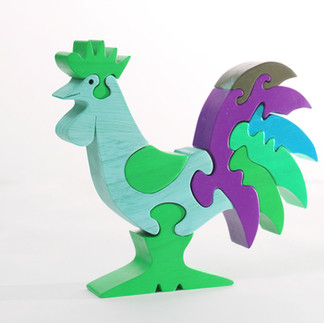In 7 steps to culinary Nirvana
- Michela Gösken

- Feb 10, 2025
- 3 min read
Are you chewing on your pencil because your stomach is growling? Then maybe it is time for a little meal, isnt’t it? But before your favorite meal comes to the table, we need to go grocery shopping first, because your fridge is about as empty as your stomach. So, you may take the big shopping bag with you and off we go!
Step 1: Of bread rolls and parking lots
First, we stop by the bakery and buy some Brötchen (=bread rolls) there. Well, if it is a German bakery, we will buy Brötchen. When we shop in Austria, we will get Semmeln, whereas in Switzerland we might get Weggli. When you take the car, in Switzerland you can parkieren (=park) your Auto in front of the Laden (=shop), in Germany please note that you can parken your Wagen in front of the Geschäft, grab your Brieftasche (=purse) your Einkaufstüte (=shopping bag) and off you go. In Switzerland the fun starts after having grabbed your Portemonnaie and your Einkaufssack, in Austria, please grab your Geldtasche and your Sackerl, gemma! (=let's go!)
Step 2: Our chickens talk to us in French, mais oui!
Next to the baker there is a Swiss Metzgerei (=butcher), a German Fleischer and what is there in Austria? A Fleischhauerei, naturally. There we buy a Hendl (=not the composer, but a chicken). Well, in Austria we will buy a Hendl. Not in Germany. There we will buy a Hähnchen. And in Switzerland the poultry speaks French, so it will be a Poulet, n'est-ce pas?
Step 3: What's wrong with the vegetables?
Would you care for oven-baked vegetables as a side dish? What should go in there? German Möhren, Paprika and Kohl (=carrots, red peppers and cabbage), Austrian gelbe Rüben, Gemüsepaprika and Kraut or Swiss Rüebli, Peperoni and Kabis? You don’t care, as long as the veggies taste the same? They do.
Step 4: Sweet cheese and Quarks that have nothing to do with physics
So, for dessert, in Switzerland we take a quick stroll to the nearest Confiserie (=confectioner) and get a piece of Quarktorte (=cheesecake), however in Austria we will treat ourselves at the local Konditorei to a piece of Topfenkuchen and in Germany we stop over at the Zuckerbäcker, where a piece of Käsekuchen awaits us, that by no means should taste of cheese! Which it would do in Switzerland, when you order a piece of Käskekuchen or Käsewähe.
Step 5: Here comes your linguistic Amuse Bouche
You feel a little dizzy and have a queasy feeling in your stomach? That hungry are you?! Oh, it’s not the hunger at all, but the strange feeling comes from all those different words for the same things and you are wondering, whether this is legal?
Yes, completely legal and unanimously approved by the multicultural editorial team of the DUDEN, the official spelling dictionary of the German language. Linguists agree that no one owns a language, thus there is no monopoly on the "right” German, but scientists are much rather are of the opinion that the German language has manifested itself in several geographical language centers, namely Germany, Austria and Switzerland.
This resulted in three different standard languages in the three countries, which largely use the same vocabulary, but sometimes surprise with variations. And that is perfectly fine and actually no typicality of German at all, since many other languages are also so-called pluricentric.
Step 6: Chips? Here only at the Casino!
For example, if you eat your Hühnchen, Poulet or Hendl in Australia, you will be served Hot Chips, in the United States you’ll get French fries and in England you will enjoy Chips with your chicken. In Chicago you will drink a pop, in London a soda and in Sidney lolly water, however, Fanta tastes just as sweet under different names.
So, if you learn German, you will get around quite a bit with German live! Once in a while, we might explore briefly how people ask you to enjoy your meal in Austria, how they greet each other in Germany and what you get to hear in Switzerland when food is ready.
Step 7: Nirvana lies behind the oven door
And now we grillieren the Poulet with Rüebli, Peperoni and Kabis in the oven at 220 degrees Celsius, we put some Anken (=butter) on the Weggli and drink ein lautes Mineralwasser (=sparkling water), while our German and Austrian neighbors may grillen their Hähnchen and Henderln ⏤ we will not oppose to that, as long as your favorite dish comes out of the oven edible and sends you off to Nirvana.
Guten Appetit! (CH) I Mahlzeit! (D) I An Guadan! (A)










Comments